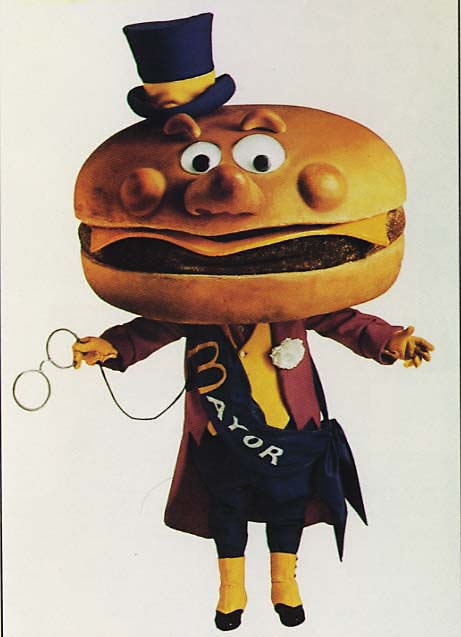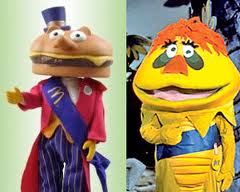Whatever Happened to Mayor McCheese?

I’ve told many people that one of the cool things about my law firm is that we don’t take ourselves too seriously. In fact, some days it’s downright fun to hang out with us.
Case in point: for the past several weeks, my friend and law partner, Greg Perleberg, and I have been verbally jousting over his ousting me from the “Mayorship” of the Firm on the social media site Foursquare. The hijinks carried through our joint birthday (yes, we both claim May 13 as our birthday and, this year, spent the better part of the day battling in the office and online as to whose birthday had priority over the other) and ultimately I decided to offer up a photo of the venerable McDonald’s character Mayor McCheese as Mr. Perlberg’s mayoral symbol, so to speak. His response? He liked it. Actually, to paraphrase a popular McDonald’s ad, he was “lovin’ it”.
There is a certain irony in my tagging my esteemed colleague, whose focus is intellectual property law, with an image of the Mayor McCheese character, as the character was deemed to infringe another character; namely, the famous Sid & Marty Krofft creation, H.R. Pufenstuf.
In 1977, the U.S. Court of Appeals for the Ninth Circuit issued an opinion entitled Sid & Marty Krofft Television Productions, Inc. v. McDonald’s Corp., 562 F.2d 1157. The salient facts of the case are as follows:
• In 1968, Sid and Marty Krofft were approached by the NBC television network to create a children’s television program for exhibition on Saturday morning. The Kroffts spent the next year creating the H. R. Pufnstuf television show, which was introduced on NBC in September 1969. The series included several fanciful costumed characters, as well as a boy named Jimmy, who lived in a fantasyland called “Living Island,” which was inhabited by moving trees and talking books. The television series became extremely popular and generated a line of H. R. Pufnstuf products and endorsements.
• In early 1970, Marty Krofft, the President of both Krofft Television and Krofft Productions and producer of the show, was contacted by an executive from Needham, Harper & Steers, Inc., an advertising agency. He was told that Needham was attempting to get the advertising account of McDonald’s hamburger restaurant chain and wanted to base a proposed campaign to McDonald’s on the H. R. Pufnstuf characters. The executive wanted to know whether the Kroffts would be interested in working with Needham on a project of this type.
• Needham and the Kroffts were in contact by telephone six or seven more times. By a letter dated August 31, 1970, Needham stated it was going forward with the idea of a McDonaldland advertising campaign based on the H. R. Pufnstuf series. It acknowledged the need to pay the Kroffts a fee for preparing artistic designs and engineering plans. Shortly thereafter, Marty Krofft telephoned Needham only to be told that the advertising campaign had been canceled.
• In fact, Needham had already been awarded McDonald’s advertising account and was proceeding with the McDonaldland project. Former employees of the Kroffts were hired to design and construct the costumes and sets for McDonaldland. Needham also hired the same voice expert who supplied all of the voices for the Pufnstuf characters to supply some of the voices for the McDonaldland characters. In January 1971, the first of the McDonaldland commercials was broadcast on network television. They continue to be broadcast.
• Prior to the advent of the McDonaldland advertising campaign, plaintiffs had licensed the use of the H. R. Pufnstuf characters and elements to the manufacturers of toys, games, lunch boxes, and comic books. In addition, the H. R. Pufnstuf characters were featured in Kellogg’s cereal commercials and used by the Ice Capades. After the McDonaldland campaign, which included the distribution of toys and games, plaintiffs were unable to obtain new licensing arrangements or extend existing ones. In the case of the Ice Capades, the H. R. Pufnstuf characters were actually replaced by the McDonaldland characters.
In the District Court, the jury found for the Kroffts and awarded damages; the Court of Appeals affirmed the lower court’s decision. In doing so, it focused on the similarities between Mayor McCheese (shown in the picture below on the left) and H.R. Pufenstuf (shown on the right):
Ultimately, the Court concluded that the use of a character with an oversized head to serve as mayor of a fictitious land was more than mere coincidence, and affirmed the findings of the District Court.
In the aftermath of the Kroffts’ legal victory, the offending characters in McDonaldland – Mayor McCheese among them – were phased out. The characters that remained following the lawsuit were Ronald McDonald, Grimace, Hamburglar, and the French Fry Goblins. Today, McDonaldland is a mere memory.
The lesson in this saga is fairly simple and straightforward: if you are an artist, be it in music, painting, entertainment or something else, be sure to take steps to protect your ideas before disclosing them to a third party. Use of non-disclosure agreements are quite common in my practice, as creative types seek to protect their ideas from unwanted and unauthorized usage following disclosure. People are not angels; if they are offered up a good idea with no prior agreement not to use or disclose it, you can almost guarantee that they’re going to do so. And while you may have a slam-dunk infringement case, whether you have the resources available to pursue such an expensive legal battle (as did the Kroffts) is another matter altogether.

